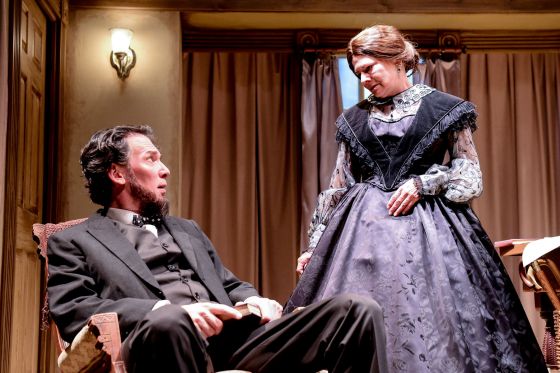
The year is 1862. The secessionist rebellion that was to have been resolved in a few months continues to escalate in volume until refugees crowd our nation's capital, and president Abraham Lincoln, beset by dissenting factions in both parties, is warned not to travel in public unescorted. Our commander-in-chief must also contend with his grief-stricken wife's response to their son's recent death from fever contracted in the sweltering heat and sewage-polluted metropolis. The specter of the Grim Reaper likewise haunts the bereaved father as he grapples with news of soldiers wounded and dying, along with the entreaties of families seeking mercy for citizens arrested amid increasing civic paranoia. Well, nobody ever said running a country was an easy job. Before our hero succumbs to the despair that threatens to reduce his homeland to irreparable disunity, though, his morale is restored by a seemingly trivial incident: taking shelter from a sudden downpour at the Ford Theater one day, he encounters superstar Edwin Booth's troupe of actors rehearsing a play. Since no one parses responsibilities of leadership more intricately than Shakespeare, the ensuing discussion provides our ambivalent POTUS a template pointing the way to solutions he will implement, albeit reluctantly. It also provides eclectic playwright James Still a framing device for his psychological analysis of our most beloved historical icon. Although our humble statesman is swift to reject behavior reminiscent of royalist protocol, the self-educated Midwesterner's journey soon begins to reflect elements of classical tragedy, expressed in the solace he derives from the Bard's words, even as ghostly visitations of adversaries disturb his rest. Our appreciation of his foresight in ensuring the legacy of his bold executive order ending slavery forever is heightened by our awareness of his own untimely end at the hands of another Booth clansman in the very theater serving as his sanctuary. Still's portrayal of his environment adopts a panoramic view, replete with battlefield witness accounts by Walt Whitman, campground letter and ballads, urbane Oval-Office badinage and nostalgic recollections of peaceful domesticity. Elevating this Shattered Globe production far above the sprawl of pageantry, however, are the nuanced performances of a company displaying some of the best ensemble work seen this year.
